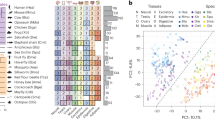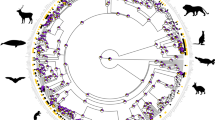Abstract
Crewe1 has recently discussed the possible influence of helminth parasites on sex determination in limpets. Following the earlier observations of Orton2, I have been studying the problem of sexuality in the Mediterranean limpet Patella coerulea L., both statistically and histologically. In contrast to the conditions in Patella vulgata, no larval Trematodes have been observed in several thousands of P. coerulea which I have examined. These parasites-must therefore be at most extremely rare in the present populations of Patella in the Bay of Naples.
This is a preview of subscription content, access via your institution
Access options
Subscribe to this journal
Receive 51 print issues and online access
$199.00 per year
only $3.90 per issue
Buy this article
- Purchase on Springer Link
- Instant access to full article PDF
Prices may be subject to local taxes which are calculated during checkout
Similar content being viewed by others
References
Crewe, W., Nature, 159, 238 (1947).
Orton, J. H., J. Mar. Biol. Assoc., 15, 852 (1928); Nature, 158, 173 (1946).
Author information
Authors and Affiliations
Rights and permissions
About this article
Cite this article
BACCI, G. Sex Reversal in Patella coerulea L. and Diodora gibberula (Lam.). Nature 160, 94–95 (1947). https://doi.org/10.1038/160094b0
Issue Date:
DOI: https://doi.org/10.1038/160094b0
This article is cited by
Comments
By submitting a comment you agree to abide by our Terms and Community Guidelines. If you find something abusive or that does not comply with our terms or guidelines please flag it as inappropriate.



